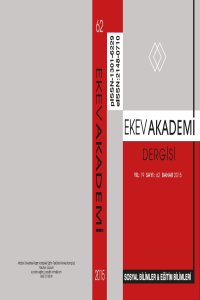Öz
Bu çalışmanın amacı İngilizce öğretmen adaylarının eğitim teknolojilerine karşı tutumlarını cinsiyet ve sınıf açısından incelemektir. 213 öğretmen adayından oluşan katılımcı grubu, eğitim teknolojilerine karşı olan tutumları açısından değerlendirilmiştir. Çalışmanın katılımcıları Hacettepe ve Gazi Üniversitelerinin İngiliz Dili Eğitimi bölümlerinde eğitim gören İngilizce öğretmen adaylarıdır. Veri toplama aracı olarak Coşkun ve Birişçi’nin (2012) geliştirdiği eğitimsel teknolojileri tutum anketi kullanılmıştır. Bu anket öğretmenlerin tutumlarını öğretmen adaylarının eğitim teknolojilerini kullanmaya karşı tutumları, derslerde eğitim teknolojilerini kullanımını destekleme, desteklenmeyen teknoloji kullanımı, teknoloji kullanmamaya karşı tutumlar ve eğitim teknolojilerinin faydaları açısından incelemektedir. Bu çalışmanın sonuçları, İngilizce öğretmen adaylarının teknoloji kullanımına karşı olumlu tutumları olduğunu göstermektedir. Erkek öğretmen adaylarının teknoloji kullanımına karşı daha olumlu tutumlarının oldukları görülmüştür. Sonuç olarak, dördüncü sınıf ve birinci sınıf öğrencileri arasında teknoloji kullanımına karşı istatistiksel farklar olduğu görülmüştür. Öğretmen adaylarının eğitimleri süresince teknolojiye karşı olumlu tutumlar geliştirdikleri öne sürülmüştür.
Anahtar Kelimeler
Eğitimsel Teknoloji İngilizce Öğretmen Adayları. Eğitimsel Teknoloji Eğitimsel Teknoloji Eğitimsel Teknoloji, İngilizce Öğretmen Adayları.
Kaynakça
- Akbaba, Altun, S. (2001). Elementary school principals’ attitudes towards technology and their computer experiments, The World Congress on Computational Intelligence (WCCI) Triennial World Conference, 10th, Madrid, Spain, September 10-15.
- Bullock, D. (2004). Moving from theory to practice: an examination of the factors that pre-service teachers encounter as they attempt to gain experience teaching with technology during field placement experiences. Journal of Technology and Teacher Education, 12(2), 211-237.
- Can, S. (2010). Attitudes of pre-service teachers from the department of elementary education towards the effects of materials use on learning, The Turkish Online Journal of Educational Technology (TOJET), 9(2), 46-54.
- Çelik, V., Yeşilyurt, E. (2013). Attitudes to technology, perceived computer self-efficacy and computer anxiety as predictors of computer supported education, Computers & Education, 60 (1), 148-158.
- Chapelle, C. (2010). Evaluating computer technology for language learning. TESLOntario, 36 (2) 56 - 67.
- Demiralay, R., Karadeniz, S. (2010). The effect of use of information and communication technologies on elementary student teachers’ perceived information literacy selfefficacy. Educational Sciences: Theory & Practice, 10 (2), 841-851
- Demirel, Ö. (2005). Planlamadan değerlendirmeye öğretme sanatı. Ankara: Pegem A Yayıncılık.
- Ertmer, P. A. (2005). Teacher pedagogical beliefs: the final frontier in our quest for technology integration? Educational Technology Research and Development, 53(4), 25-39.
- Friedman, A., Bolick, C., Berson, M., Porfeli, E. (2009). National educational technology standards and technology beliefs and practice of social studies faculty: Results from a seven year longitudinal study, Contemporary Issues InTechnology and Teacher Education, 9(4), 476-487.
- Gorder, L. M. (2008). A study of teacher perceptions of instructional technology integration in the classroom. Delta Pi Epsilon Journal, 50(2), 63–76
- Govender, D. W. (2012). A model to predict educators’ attitudes towards technology and thus technology adoption. African Education Review, 9(3), 548-568.
- Hermans, R., Tondeur, J., van Braak, J., Valcke, M. (2008). The impact of primary school teachers’ educational beliefs on the classroom use of computers. Computers & Education, 51(4), 1499–1509.
- Higgins, S., Moseley, D. (2001). Teachers, thinking about information and communications technology and learning: beliefs and outcomes. Teacher Development, 5(2), 191- 210.
- Huang, H. M., Liaw, S. S. (2005). Exploring user’s attitudes and intentions toward the web as a survey tool. Computers in Human Behavior, 21(5), 729-743.
- Inan, F. A., Lowther, D. L., Ross, S. M., Strahl, D. (2010). Pattern of classroom activities during students’ use of computers: relations between instructional strategies and computer applications. Teaching and Teacher Education, 26(3), 540-546.
- Jonassen, D., Reeves, T. (1996). Learning with technology: Using computers as cognitive tools, In D. H. Jonassen (Ed.), Handbook of research on educational communications and technology (pp. 693-719), New York: Macmillan.
- Koşar, E., Yüksel S., Özkılıç, R., Avcı, U., Alyaz, Y., Çiğdem, H. (2003) Öğretim teknolojileri ve material geliştirme, (2.Baskı), Ankara: PegemYayınları Liu, S.H. (2011). Factors related to pedagogical beliefs of teachers and technology integration, Computers & Education, 56: 1012-1022.
- Metin, M., Kaleli Yılmaz, G. ,Coşkun, K., Birişci, S. (2012). Developing an attitude scale towards using instructional technologies for pre-service teachers, TOJET: The Turkish Online Journal of Educational Technology, 11 (1), 36-45.
- Myers, J. M., Halpin, R. (2002). Teachers’ attitudes and use of multimedia technology in the classroom: Constructivist-based professional development training for school districts. Journal of Computing in Teacher Education, 18(4), 133-140.
- Ozgen K., Obay, M. (2008). Ortaöğretim matematik öğretmen adaylarinin eğitim teknolojisine ilişkin tutumlar, IETC 2008, Anadolu University Faculty of Education Department of Computer Education &Instructional Technologies, Eskişehir.
- Pala, A. (2006). İlköğretim Birinci Kademe Öğretmenlerin Eğitim Teknolojilerine Yönelik Tutumları, Sosyal Bilimler Dergisi, 16, 177-188.
- Palak, D., Walls, R. T. (2009). Teachers’ beliefs and technology practices: a mixedmethods approach. Journal of Research on Technology in Education, 41(4), 417-441.
- Park, S. H., Ertmer, P. A. (2007). Impact of problem-based learning (PBL) on teachers’ beliefs regarding technology use. Journal of Research on Technology in Education, 40(2), 247–268
- Teo, T. (2008). Pre-service teachers’ attitudes towards computer use: A Singapore survey, Australasian Journal of Educational Technology, 24(4), 413-424.
- Tezci, E. (2009). Teachers’ effect on ICT use in education: The Turkey sample. Procedia - Social and Behavioral Sciences, 1, 1285-1294.
- Topkaya, E. Z. (2010). Pre-service English language teachers’ perceptions of computer self-efficacy and general self-efficacy. TOJET: The Turkish Online Journal of Educational Technology, 9(1), 143-156.
- Yavuz, S., Coskun A. E. (2008).Sınıf öğretmenliği öğrencilerinin eğitimde teknoloji kullanımına ilişkin tutum ve düşünceleri, Hacettepe Üniversitesi Eğitim Fakültesi Dergisi, 34, 276-286
- Yılmaz, M. (2005). İlköğretim 7.sınıflarda simetri konusunun öğretiminde eğitim teknolojilerinin başarı ve tutuma etkisi. Marmara Üniversitesi Eğitim Bilimleri Enstitüsü, Yayımlanmamış Yüksek Lisans Tezi,İstanbul.
- Zhao, Y., Lai, C. (2007). Technology and second language learning: Promises and problems. In L. L. Parker (Ed.), Technology-mediated learning environments for young English learners: Connections in and out of school (pp. 167–205). Mahwah, NJ: Lawrence Erlbaum Associates.
Ayrıntılar
| Birincil Dil | Türkçe |
|---|---|
| Bölüm | Makaleler |
| Yazarlar | |
| Yayımlanma Tarihi | 30 Nisan 2015 |
| Yayımlandığı Sayı | Yıl 2015 Sayı: 62 |


